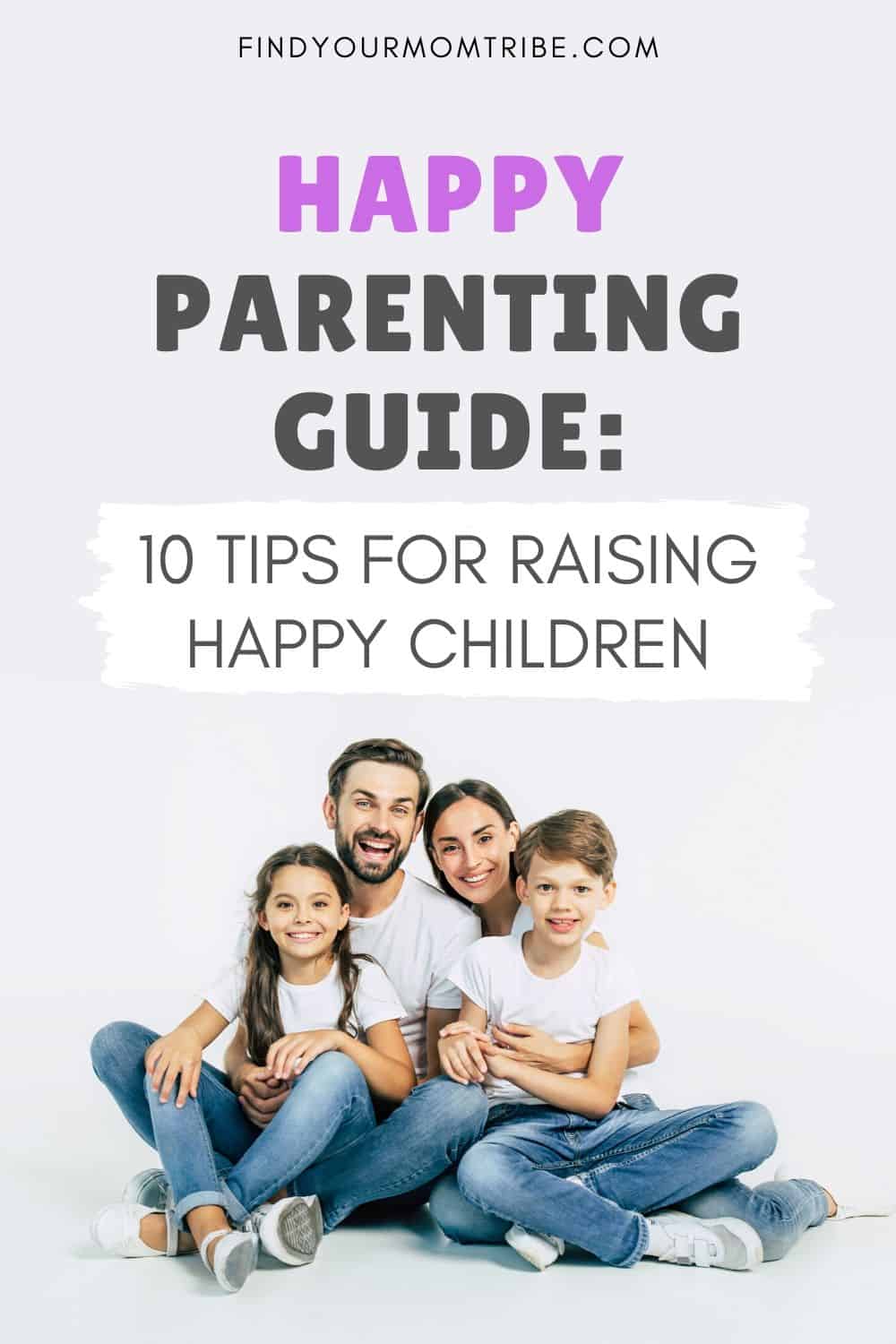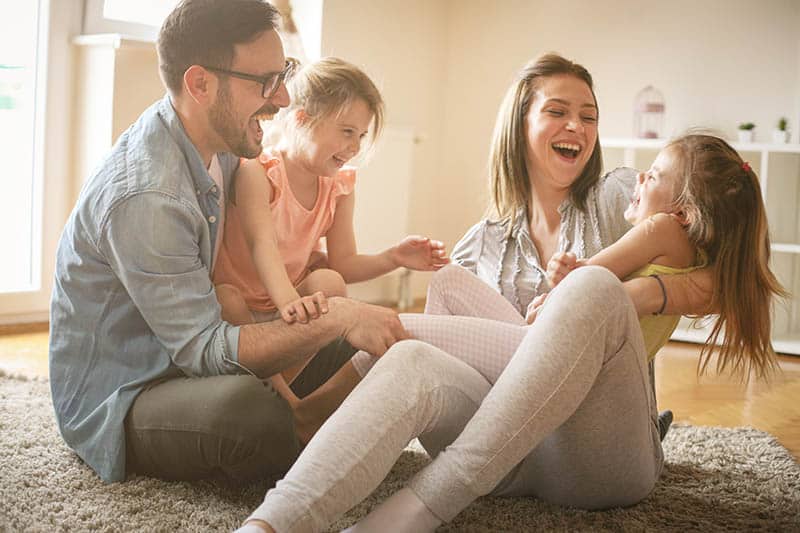Parenting is one of the hardest jobs in the world, but also one of the noblest.
Every parent’s main goal is to establish happy parenting and raise happy children but sometimes it can be a real struggle, especially for new parents.
Parenting style greatly affects child development, as well as the well-being and mental health of a child, which is why it’s important to step up your game as a parent and do the best job you can!
Now, don’t get me wrong – there’s no such thing as a perfect parent.
All parents make mistakes but this doesn’t mean that they are bad parents.
Good parenting is about being willing to constantly improve, educate yourself, and look for new ways to boost your parenting performance!
And, don’t worry, you don’t need to read tons of books (and Lord knows, you probably don’t even have time) in order to learn all the secrets of happy parenting.
All you need to do is read the following list of the ultimate parenting advice and tips for raising happy children, because happier kids = happier parents!
(And in case you’re interested in reading or listening, below I’ll also list some of the best parenting books that you can order on Amazon in multiple formats!)
10 TIPS FOR RAISING HAPPY CHILDREN
1. Focus on the present

Only focusing on the future and things that might or could go wrong makes parenting a stressful experience.
While overthinking and worrying about your child throwing a tantrum in a store, being mocked by other children, being served alcohol at a party and similar, you’re concentrating on all the negative things that might happen in the future instead of focusing on the present.
Because they are worrying about their children, parents often forget that they can’t control the future.
The only thing they can control is the present, which is why focusing on what is going on now in front of them and directing their energy toward things they can influence and make right is of the utmost importance when it comes to happy parenting.
Remember that all the other things that might happen in the future can be dealt with according to the principle: “If something happens, I’ll deal with it.”
Because the worst thing that can happen to a parent is realizing that they wasted all their time worrying instead of enjoying the precious moments spent with their children.
2. Give your kids a chance to make mistakes

Instead of constantly losing your cool, warning and blaming your children for something they’ve done wrong, give them a chance to make mistakes.
Why? Because we all learn from our mistakes!
If you constantly judge your children whenever they make a mistake, there is a good chance that they will turn into future perfectionists (speaking from experience) because they will develop a fear of failure and they will not know how to cope with the negative things in life.
But, if you give them some space to make mistakes, they will learn valuable lessons from them and remember not to repeat them in the future.
Also, they will understand that mistakes are an inevitable part of everyday life and they are not something they need to be afraid of.
3. Remove the power-struggle from the parent-child relationship

When we treat young children as little creatures who know nothing about the world and when we act as superior to them, we create a huge gap and we make ourselves unavailable and incomprehensible to children.
Building the parent-child bridge includes listening to your child with the same amount of respect and understanding as with others and answering their questions in a mature way with some simplified terms adapted to their age.
Children need to feel that they are understood instead of being controlled and commanded.
One of my good friends explained this theory in the following way:
His then girlfriend and her ex-husband didn’t want their children to enter a certain room for some reason and all they said to their children was “No, do not enter there”.
They didn’t explain to them why, so the children persisted in doing it because they were told “no” and because they were curious about what was behind the doors.
And then, my friend told them that they shouldn’t enter because there were some invisible creatures resting there and they didn’t want to wake them up because they needed to recharge themselves so that they could continue their journey.
The kids understood immediately and acted as if they were doing a good thing by leaving them in peace to rest.
You see, the sentence “No, do not enter there” screams command and control, whereas my friend’s creative explanation creates a perfect parent-child bridge essential for kids to understand a certain situation and to feel as though they are an active part of the story – as an equal.
4. Praise them regularly and practice gratitude

The drill goes like this: Your child does something bad and you immediately punish them and tell them that they shouldn’t have done it.
However, when your child does something good, you forget to praise them because this behavior is expected. The accent is on EXPECTED.
By doing this, you don’t motivate your children to keep doing good things and behaving in a certain way becomes expected of them.
They get confused and sad about the fact that everything bad is always noticed, but good things aren’t.
Because of this, they might start feeling like they will never be good enough, no matter what they do.
That’s why it’s important to praise them on a regular basis for all the little things and big things they do.
Also, it’s important to practice gratitude at the end of the day or before a meal, where everyone recounts a few positive things that happened that day for which they are grateful.
5. Plan family play time

It’s good for children to play alone, or with their siblings or friends, but it’s important to incorporate family traditions, rituals and play time as well.
I understand that in today’s busy modern lives parents often forget this, but keep in mind that this family practice will result in a happier family life!
And to do it, the only thing you need is play area and creativity.
The most popular game is building a fort – an activity that is enjoyable for both parents and kids.
This will be a great chill time for the whole family, so make sure to reserve some time in your calendar for precious family play time!
6. Set a schedule

Many parents lose control and just decide to go with the flow but (I’m sorry to tell you) this is not a good idea!
With multiple obligations besides parenting, it’s really hard to think about every single detail of your child’s life and that’s where setting a schedule comes in handy for both children and parents!
This means setting a schedule for meal times, sleep time, screen time, play time and so on.
This will save you tons of annoyance in the future because you’ll no longer have to yell at them at 3AM to go to sleep as it will have become a part of their routine.
It might be a funny comparison, but kids are just like cats.
If you let them do what they want when they want, they will become unstoppable and over time they won’t give a damn about what you say to them.
But, if you establish some ground rules and set a schedule for every activity and stick to it no matter what, they will accept it and won’t ever question it (just like my extrovert cat who I recently taught when feast time, play time and the sleep time are).
7. Be a safe haven for them

No matter how stressed you are, and no matter how many things you have to do, always be a safe haven for your children!
Children are sensitive to everything and especially to new stimuli in their environment.
They can easily get hurt and feel helpless or confused about certain situations, which is why they need to know that they can count on your support no matter what.
They need to know that you are their safe haven and that no matter what happens, they will be able to talk to you and tell you how they feel about it.
This is the most important aspect of building a healthy parent-child relationship and gives a child the necessary feeling of security and understanding.
8. Put love into all your interactions

They observe the way you treat other people, your neighbours, family, their siblings, your friends and so on, and they draw conclusions from what they see.
Also, they notice if your interactions with them have become devoid of warmth and love for them.
Hugging, kissing, and telling your little ones that you love them are crucial for their development into healthy future adults.
No matter if your child is a teenager or a toddler, they all deserve to be treated with the same amount of affection.
Just because teenagers act rebellious, it doesn’t mean that they have outgrown the need for a parent’s love.
RELATED: Raising Teenagers: Important Things To Remember
And even if they’re not comfortable with hugging (because they want to stay cool in front of their peers), you can express love in other ways by using words or with little gestures that mean a lot (like preparing their favorite meal or buying tickets to a concert or similar).
9. Involve them in decision-making processes

A child that is never given an opportunity to be a part of making decisions – whether for them or something general – will never feel competent enough in future to decide for themselves.
They will become utterly indecisive in every field of their life, from simple tasks like choosing socks to complex ones like choosing what they want to study.
Involving them in decision-making processes will give them a sense of responsibility and prepare them for future tasks they will have to deal with as adults.
And this doesn’t have to be big.
You can start by letting them decide what they want to wear and then gradually move on to more important things, like teaching them about financial responsibility.
RELATED: Finance Books For Kids: 17 Personal Finance Reads For Children
It’s one of the best things you can do for your child, so let them express their own opinion and respect it!
10. Be a good role model

They see you as their role models and everything you do or say will be saved in their little heads and processed for their future actions.
Happy parenting is all about being a good role model to your children and always thinking about your own actions and words.
The best way to be a good role model is to always ask yourself whether you would want your child to repeat your action.
If not, then you know you shouldn’t do it either.
It’s all about reflecting on your previous and future actions and constantly striving to be the best version of yourself.
And even if you make a mistake, remember that it’s not the end of the world.
What matters is that you tell your children that you made a mistake and you shouldn’t have done or said something.
Being self-critical and acknowledging your mistakes will teach them that they don’t need to be perfect, just willing to work on themselves and turn their failures into lessons.
Be The Kind Of Person You Want Your Child To Be!

And if you need more parenting tips and advice, I suggest checking out these amazing parenting books that you can order on Amazon by simply clicking on the title:
| Image | Title | Price | Prime | Buy |
|---|---|---|---|---|
 | Simplicity Parenting: Using the Extraordinary Power of Less to Raise Calmer, Happier, and More Secure Kids | PrimeEligible | Buy Now | |
 | Peaceful Parent, Happy Kids: How to Stop Yelling and Start Connecting (The Peaceful Parent Series) | PrimeEligible | Buy Now | |
 | Simple Happy Parenting: The Secret of Less for Calmer Parents and Happier Kids | PrimeEligible | Buy Now |
The authors of these books will introduce you to simpler ways of parenting and they will share secrets for raising happy children and establishing a healthy, powerful connection with them!
And in case you don’t have time to read (or you’re not a book lover), today is your lucky day because the first two books come in MP3 CD format as well, which means you can absorb the wisdom of happy parenting while cooking, jogging, or simply resting.
READ NEXT:
- Being A Mom Is Hard, But SO Worth It
- How To Be A Better Mom: 10 Steps To Move In The Right Direction
- The 9 Best Tips On Praising Children Without Spoiling Them
- The Ultimate List Of 88 Nanny Interview Questions (+Pro Tips)
- Everything You Need To Know About The RIE Parenting Method
Like this post? Please share or pin it for later. You can also stay in the loop and follow us on Facebook, Instagram and Pinterest.

We love honesty! Find Your Mom Tribe is an Amazon Associate and we earn from qualifying purchases through affiliate links at no extra cost to you. Please see our full Amazon Affiliate disclosure for more information.

